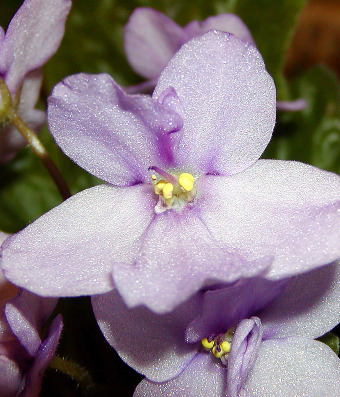 The Miracle of the Violet
The Miracle of the Violet
When I was a newlywed and working overtime to get everything just right, I absentmindedly set a flowering African violet on the radiator before leaving on vacation for a week. I returned to a crispy brown mess, and the subsequent teasing from my husband, who dubbed me a violet assassin.
Ever hopeful, I took that poor little plant and watered it, carefully removing the dead leaves. It wasn’t so hard – the poor little crispy leaves just fell off, making a sad rustling sound on the counter.
I really did feel like an assassin, but I took the dried up husk of a plant and placed it on the windowsill in the kitchen. I checked it every day, adding water often and gingerly removing the dried parts. One day, I saw some green growth. Before long, I had beautiful little purple buds.
My husband was still laughing at me, but this time he had a pleased twinkle in his eye when he told me I must have loved the plant back to life because I had surely killed it dead.
The miracle of the African violet with the will to live continues to be told in our family. It’s been embellished a little over the years, but I don’t mind being the comic foil in the story.
That African violet has become a rather unlikely symbol of hope for us. Whenever things get desperate or difficult, we liken our resolve to the violet that wouldn’t die.
Maybe it was stubbornness or hardheadedness that moved me to try to save the plant. Maybe it was just ignorance – I thought a little water could fix everything.
My husband probably knew better, but aside from the playful teasing, he stood by me while I ministered to the little violet. He could have called me crazy for real and thrown away the plant, but he didn’t.
Instead, he indulged me.
And for 27 years he’s continued to indulge me, and I’ve continued to hope.
We’ve faced our fair share of joy and heartbreak in these years. Not so much the stuff of soap operas as the stuff of life.
Sometimes it’s been hard to keep hope alive. Death, disappointments, and illness try my faith. Mostly it’s because I haven’t always understood the meaning of hope, confusing it with wishful thinking, or considering it a prayer for a certain outcome – an outcome I wanted for my reasons.
As my faith has matured over the years, I’ve come to understand the power of a different prayer, the surrender of Thy will be done, and the hope that is inherent in such a prayer.
A large part of it is the realization that hope doesn’t fix things; it puts everything in its proper perspective.
The Catechism of the Catholic Church clarifies:
The virtue of hope responds to the aspiration to happiness which God has placed in the heart of every man; it takes up the hopes that inspire men's activities and purifies them so as to order them to the Kingdom of heaven…. (par. 1818)
I was so focused on the short term that I missed the eternal implications of hope, and how closely it is tied to love.
These days I don’t kill many plants. It has less to do with having a green thumb and more to do with the fact that life is beginning to slow down around here. I’m not rushing out the door, juggling kids, thinking about what I’m going to prepare for dinner before I’ve even had breakfast.
Now, you’ll find me fiddling with some plants in the back yard, trying to coax one more raspberry from a baby bush. You’ll see my husband smiling from the deck, delighting in my joy when I pluck a ripe berry off the bush and pop it in my mouth.
No matter how many berries I eat, it seems there are more growing, hidden behind the leaves just waiting for the right time to pop out.
As I putter around these plants, I’m reminded of the African violet. The one I hoped would get better, and it did because I loved it, as much as one can love a flower. I can’t suppress the smile that pulls at the corners of my mouth as I tend to these new fragile plants.
There’s a certain timelessness to gardening. A lot of watching and waiting. And waiting some more, joyfully, as I trim away the dead leaves and weeds, knowing that eventually the plant will flower.
… it opens up [my] heart in expectation of eternal beatitude...to the happiness that flows from charity. (CCC par. 1818)
I smile at the expectation that if things don’t go the way I want, that by a greater design, they will be as they should be. And I am filled with hope.
El milagro de la violeta
Por María Morera Johnson
Cuando era recién casada y con poca experiencia como ama de casa, puse distraídamente una violeta en el radiador antes de irme de vacaciones por una semana. Regresé a una violeta seca y media muerta. Mi esposo, riendose de mi tristeza por una matica que se podia reemplacer, dijo que yo era asesina de violetas.
Siendo optimista, tomé esa matica pequeña y la regué, quitando con cuidado las hojas muertas. No fue tan difícil – las hojas, más que secas, se cayeron sólas, susurrando en el mostrador. Me sentí realmente como una asesina, pero tomé esa cáscara y la coloqué al lado de la ventana en la cocina.
La regué a menudo, quitando las hojas secas con mucho cariño. Un día, vi una hojita verde. Dentro de poco, tuve hermosos brotes pequeños de morado.
Mi esposo todavía se reía de mí, pero siempre con cariño. Le daba alegria verme contenta. Me dijo que el cariño salvo la violeto – porque sin duda estaba muerta cuando la encontramos aquel día.
El milagro de la violeta con la voluntad para vivir se convirtio en una de esas historias familiales que sacamos de vez en cuando para compartir la experiencia, un ejemplo de fé que nos sirve a todos.
Esa violeta ha llegado a ser un símbolo de esperanza para nosotros. Cuando las cosas se ponen difícil, comparamos nuestra resolución a la violeta que no se dio por vencida.
Quizá fue la terquedad. Quizá fue sólo ignorancia – pensé que un poco de agua podría ser la solución. Mi esposo probablemente supo mejor, pero aparte de las bromas y el juego, no dejó de apoyarme con la violeta. Pudiera haber botado la matica, pero no lo hizo.
Al complacerme con ese detalle, me enseñó que con la esperanza necesito paciencia.
Ha sido difícil a veces de mantener la esperanza. La muerte, las desilusiones, y enfermedad me distraen.
En su mayor parte es porque yo no he comprendido el significado de la esperanza, confundiendolo con ilusiones, o teniendo en cuenta una petición para un resultado – un resultado que deseo sin tomar en cuenta lo que Dios quiera.
Mi fé ha madurado con el paso de los años. Comprendo el poder de otra oración, cuando rezamos hágase tu voluntad en el padre nuestro, y la esperanza que forma parte de esa oración.
La parte importante es la realización que la esperanza no cambia las cosas; sino, pone todo en su perspectiva apropiada.
El Catecismo de la Iglesia Católica clarifica:
La virtud de la esperanza corresponde al anhelo de felicidad puesto por Dios en el corazón de todo hombre; asume las esperanzas que inspiran las actividades de los hombres; las purifica para ordenarlas al Reino de los cielos…. (par. 1818)
Estaba tan concentrada en el término corto que perdí las implicaciones eternas de la esperanza, y su relación a el amor.
Ya no mato muchas plantas. La vida comienza a ir más despacio por acá. No salgo corriendo por la puerta, pensando en lo que prepararé para cenar antes que haya tenido aún el desayuno.
Disfruto de las flores en el patio. Le presto atención a una matica de frambuesa que da fruticas a menudo. Cambio miradas con mi esposo, que esta sentado en la terraza. Nos reimos cuando arranco una baya madura del arbusto y lo pincho en mi boca.
Por mucho que coma, aparecen más, ocultados atrás de las hojas esperando sólo el momento oportuno de salir de repente. De vez en cuando recuerdo la violeta en un momento de distracción y no puedo suprimir la sonrisa que me jala el corazón.
Aprendo mucho en este jardín. Es una oportunidad de practicar la paciencia. Hay que mirar…observer…esperar. Sigo esperando mientras corto las hojas muertas, sabiendo que algún día florecerá el jardín. Mientras tanto…
[se me]…dilata el corazón en la espera de la bienaventuranza eterna. El impulso de la esperanza preserva del egoísmo y conduce a la dicha de la caridad. (par. 1818)
Vivo con la esperanza que si las cosas no van como quiero, serán como deben ser… y sonrío.
About the Author

Maria Morera Johnson
Maria Morera Johnson, author of My Badass Book of Saints, Super Girls and Halo, and Our Lady of Charity: How a Cuban Devotion to Mary Helped Me Grow in Faith and Love writes about all the things that she loves. A cradle Catholic, she struggles with living in the world but not being of it, and blogs about those successes and failures, too.


.png?width=1806&height=731&name=CatholicMom_hcfm_logo1_pos_871c_2728c%20(002).png)
Comments